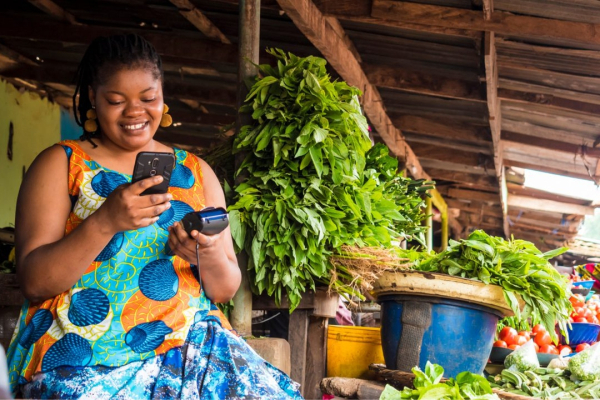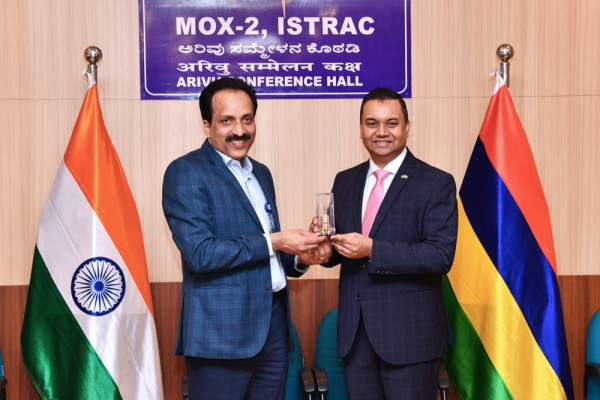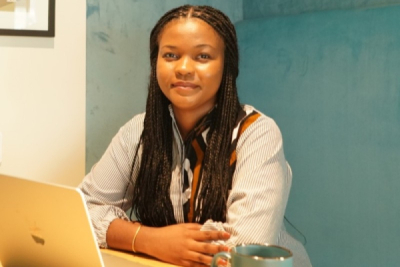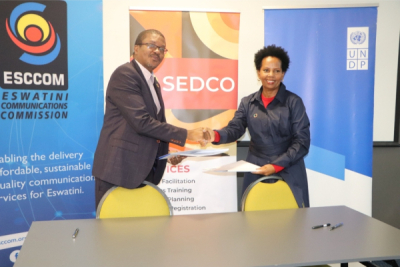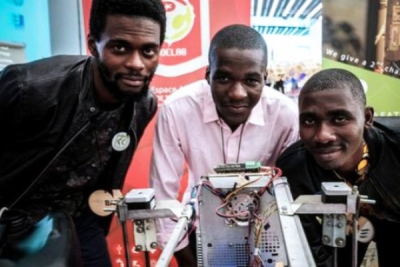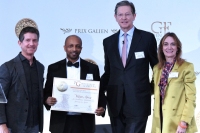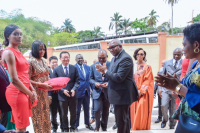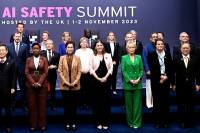Global finance has gone digital to prioritize convenience, efficiency, and speed. This choice has yielded positive effects across various sectors, particularly in commerce. In Africa, financial experts have also embraced this transformation but numerous challenges persist.
The fifth edition of the Next Fintech Forum will be held in Abidjan, Côte d’Ivoire, on November 16-17, under the theme "Fintech and commerce: shaping African trade." Organized at the Radisson Blu by the Africa Fintech Forum, the two-day event will bring together several experts, entrepreneurs, and enthusiasts from e-finance, commerce, finance, logistics, and many other related sectors.
They will discuss the impact of fintech on African commerce, and share their knowledge, ideas, and experiences in using financial technologies to stimulate business growth, enhance the customer experience, and strengthen the competitiveness of African trade on a global scale.
Speaking about the objectives of the Next Fintech Forum, Alex Sea, President and CEO of the Africa Fintech Forum, states: "In recent years, there has been a surge in the development of new business models, groundbreaking technologies, and customer-centric experiences that are revitalizing the global financial landscape. Fintech, which is the application of technology to deliver innovative financial solutions, is experiencing unprecedented growth. [It is] an attractive and dynamic sector that needs to be developed and structured, particularly in French-speaking Africa. Mindful of the disparity between a thriving, rapidly expanding industry and local infrastructures that may not be adequately equipped to harness the full potential of Fintech, our aim is to effect positive change.”
Over the past five years, the fintech sector has attracted the most interest from venture capitalists and angel investors in Africa. Of the $6.5 billion raised by African startups in 2022 –up 8% compared to 2021 according to Partech Africa– the fintech sector alone raised $1.9 billion (29.23% of all funds). However, fintechs have not gained credibility or evolved their services sufficiently to meet the new needs of African markets.
In his report "Limits to the expansion of African fintechs", Idriss Linge, business journalist and editor-in-chief of Agence Ecofin, explains that fintechs need to overcome a number of challenges if they are to prosper further on the continent: they need to go beyond money transfer, payment or even small-scale credit.
With the African Continental Free Trade Area (AfCFTA) becoming effective in January 2021, numerous commercial and financial opportunities are emerging on the continent. Opportunities to which fintechs could respond effectively through innovative solutions that will stimulate business growth and boost the competitiveness of African trade on a global scale.
During the last two decades, approximately forty African satellites have been successfully launched into orbit, significantly enhancing telecommunications capabilities and territorial surveillance across the continent. With several more satellites currently in the developmental phase, scheduled launches are anticipated within the upcoming months.
On Wednesday 1ᵉʳ November, the Mauritius Research and Innovation Council (MRIC) and the Indian Space Research Organisation (ISRO) signed a memorandum of understanding to develop, launch, and operate an Earth observation satellite for Mauritius.
The partnership, which runs over 15 months, also takes into account the training of MRIC engineers at ISRO's facilities in India for the design and development of the satellite platform, as well as its associated systems and primary payload.
The new MoU follows a recent visit to Bengaluru by Mauritius' Minister of Information Technology, Communication and Innovation (MITCI), Darsanand Balgobin (photo, right), and MRIC Board Chairman Dr Kaviraj Sharma Sukon. The delegation met with ISRO officials and discussed the technical details and application possibilities for putting a joint satellite into orbit.
The future joint microsatellite will be designed for remote sensing from Low Earth Orbit (LEO). It will enhance Mauritius's earth observation capabilities and the help prevent and combat bushfires, floods, and erosion, and develop agriculture, among other things. On completion, all corresponding in-orbit operations will be carried out jointly by ISRO and MRIC, using MRIC's ground station.
India was not randomly chosen as the technical partner of that project. Several years ago, it signed technological cooperation agreements with four African countries, including Mauritius. The country is committed to providing substantial support for the scientific and technological development of these countries.
Samira Njoya
E-health solutions are rapidly gaining momentum across the continent, providing accessible healthcare options. In response, tech entrepreneurs are continually innovating with practical solutions that aim to enhance the daily lives of their fellow citizens.
Assista Soins is an e-health solution developed by an Algerian startup, established in 2022. It enables access to healthcare services and professionals.
The solution features a mobile application accessible only on Android. After downloading, users can create their Assista Soins account with their details to access the services available. These include medical consultations, nursing care, blood sampling, medical transport, etc. through a network of over 185 partners.
Once a user chooses the service he/she needs, the mobile app will suggest qualified professionals depending on the user’s geographic location. Then, the user has to select the desired professional and confirm the appointment.
Users have the option to subscribe to Assita Soins' services on behalf of a third party, such as a family member or friend. As of August 2023, the e-health platform has facilitated over 300 interventions across all the communes of the Wilaya of Constantine. Recognized for its outstanding contribution, Assita Soins has been selected to represent Algeria at the World Entrepreneurship Summit scheduled for April 2024 in Chile. Its mobile application has already garnered over 500 downloads, as per data from the Play Store.
Adoni Conrad Quenum
The serial entrepreneur co-founded Mstudio to support and finance entrepreneurs in French-speaking Africa. With a particular emphasis on empowering women and the youth, she aims to foster the growth of Africa's next generation of unicorns.
Leslie Ossete (photo) is a serial technology entrepreneur of Congolese and Madagascan descent. Raised in Congo, she moved to the United States to pursue her studies. In 2012, she graduated from UWC-USA (United World College) with an International Baccalaureate. In 2016, she got a Bachelor’s in Economics, Business, and Nonprofit Management from Earlham College.
Driven by the ambition to transform the informal sector in French-speaking African countries, she co-founded Mstudio, the first “mobile” startup studio in French-speaking West Africa, in September 2022.
The studio, where she serves as the Chief Operating Officer, creates and finances startups that meet current needs in the informal sector. It also provides expert support, drawing inspiration from business models that work in English-speaking African countries. Based in Côte d'Ivoire, it focuses particularly on women and young people, who are the main users of mobile technology in Africa.
"Our approach aims to narrow the investment gap in French-speaking Africa by assisting entrepreneurs in establishing high-impact startups, mirroring successful business models from English-speaking Africa, Latin America, and Asia rather than reinventing the wheel. As the pioneering startup studio in French-speaking Africa, we offer not just expertise and funding, but also an unparalleled network for the startups we champion," Leslie Ossete explained in late May 2023.
In 2015, the latter co-founded BuuPass, a digital marketplace that enables urban travelers to book their tickets. She served as its CEO until 2017. She boasts a professional career with several African companies such as Bolt Kenya, the mobility company, where she was COO in 2019, and Wave Mobile Money where she was successively, between 2020 and 2022, the company's launcher in West African countries and head of growth.
With BuuPass, Leslie Ossete won the prestigious Hult Prize awarded by US President Clinton to young entrepreneurs in 2016. In 2017, she became the winner of the African Women in Technology Prize. The following year, Transdev awarded BuuPass as one of the best transport innovations working on the technology scene in Nairobi, Kenya.
Melchior Koba
To accelerate the realization of their digital ambitions, governments are teaming up with reliable and experienced partners to get technical support for some projects.
On Wednesday, November 1, the Eswatini Communications Commission (ESCCOM) and the United Nations Development Programme (UNDP) signed a memorandum of understanding at the United Nations House in Mbabane.
According to a UNDP press release, the agreement aims, among other things, to improve universal access to affordable ICT services; provide digital services and other government functions; and support the effective implementation of the national digital strategy developed under ESCCOM's leadership.
"This agreement will play a pivotal role in accelerating our progress towards achieving the Sustainable Development Goals. These goals encompass vital indicators such as reducing youth unemployment, bolstering food security, broadening access to ICTs, digitizing services, and fostering financial inclusion throughout Eswatini," said Mvilawemphi Dlamini (photo, left), ESCCOM's Chief Executive Officer.
The agreement calls for the creation of iHubs (innovation hubs) and digital technology action centers to deepen digital inclusion and improve youth employability. These centers will be designed as one-stop shops for ICT training, business development, business relations, financial services, and business mentoring.
The agreement is part of ESCCOM's efforts to develop digital technology and reduce the digital divide in the country. In June, ESCCOM announced the signature of a telecoms agreement with the Mozambique Communications Regulatory Authority (INCM). Ultimately, the agreement with the UNDP will, among other things, help reduce the digital divide in Eswatini, with a focus on marginalized people, notably young people, women, and the disabled.
Samira Njoya
Woelab is a visionary organization at the heart of African innovation. Under the leadership of Sénamé Koffi Agbodjinou, the center has quickly emerged as a trailblazer in the realm of technology and as a support for young innovators.
Established in August 2012, WoeLab serves as a technology hub that fosters, trains, incubates, and accelerates startup initiatives across Africa. Situated in Lomé, Togo, and launched as a component of the HubCité initiative by the L'Africaine d'architecture platform, this fabrication laboratory was founded by Sénamé Koffi Agbodjinou (photo, left), a young independent researcher, architect, and anthropologist from Togo.
Beyond being just a laboratory, WoeLab serves as an inclusive, collaborative space for fostering creativity, an incubator for startups, and an informal training ground. Within its premises, about thirty young individuals craft an array of devices using components gathered from trash cans. One of WoeLab's most remarkable achievements is the W.Afate 3D Printer, Africa's first 100% recycled open-source 3D printer. Several units of that 3D printer have already been sold.
The laboratory provides free support for the center's artisans in their technological projects and introduces them to digital manufacturing. Additionally, it hosts educational initiatives for youth, including the "3DprintAfrica Educative" program, which aims to educate them on designing systems compatible with 3D printers and creating practical objects for their surroundings.
WoeLab positions itself as a realm of "technological democracy," where everyone can innovate and contribute to the advancement of human knowledge while honoring the environment and local culture.
The diversity of its programs is also a major asset for young people. It has developed projects solving a number of urban problems, such as waste management (SCoPE), food and energy resources (Urbanattic), and digital currency (Sys'Woe).
The fablab was noticed by NASA in 2013 and finished in the top 30 (out of over 700 projects worldwide) of finalists in the "Special Challenge" organized each year by the US space agency. It boasts 1,300 m² of coworking space and has already trained over 500 fellows. The center is home to 12 start-ups and has organized 200 free public events. It is supported by 30 active partners worldwide
Melchior Koba
On Thursday, October 26, the Prix Galien USA Awards committee announced the winners of the 2023 edition of the Prix Galien USA, named after the forefather of modern medicine and pharmacology. Kenyan incubator Villgro Africa, which supports startups operating in the healthcare sector, was selected in the Best Incubator and Accelerator category.
Last November 2, DRC Prime Minister Sama Lukonde Kyenge officially inaugurated a data center built by Huwaei at the Ministry of Finance headquarters in the framework of a project to modernize ICT infrastructure.
The data center, financed by the Export-Import Bank of China, will centralize, merge, secure, and store the activities of the country's financial authorities.
The African continent has a number of assets to help it become a leader in the field of artificial intelligence, including its young population. However, it needs to groom those assets to be able to capitalize on available opportunities.
The UK and partners have pledged £80 million ($100 million) to accelerate development in several African countries through the use of artificial intelligence (AI). The investment was announced, by the British government, at the AI Safety Summit held in England from November 1 to 2.
The first phase of the project, which will initially focus on sub-Saharan Africa, aims to, among other things: create or develop at least 8 responsible AI research labs in African universities; help at least 10 countries create robust regulatory frameworks for responsible, fair and safe AI; help reduce barriers to entry for African "AI-innovators" into the private sector.
"This collaborative initiative is of paramount importance as it empowers African countries to become producers, not just consumers, in the AI revolution, ensuring that we are at the forefront of shaping our own future and driving sustainable progress across the continent," said Paula Ingabire, Rwanda's Minister of Information Technology and Innovation.
According to a UK government's press release, this new collaboration is part of a wider UK commitment to harnessing the opportunities of AI and “ensure its use as a force for good.”
As part of the partnership, AI scholarships will be awarded to students at African universities. The collaboration will also support investment in the creation of data models ensuring an accurate representation of Africa. In addition, it will enable the establishment of responsible AI governance frameworks to manage the potential risks associated with its use.
Samira Njoya
During the Covid-19 pandemic, the two brothers behind the solution felt the heightened need to send funds to their relatives but, the available solutions were not up to their taste. With their backgrounds in finance and IT, they then decided to set up a proper solution. A few years later, MyEasyTransfert was born.
MyEasyTransfert is a fintech solution developed by a Tunisian startup. It enables Tunisians living in Europe to send money to their loved ones via a mobile app or web platform from a smartphone or computer. The startup was founded in 2022 by the Khenissi brothers, Ismaïl and Jabrane. Last week, it announced the successful completion of a €500,000 financing round to improve its technology and expand into new African markets.
"We want to offer every Tunisian living abroad the possibility of managing all their financial transactions to Tunisia from their smartphone with our platform," explains Ismaïl Khenissi.
The MyEasyTransfert mobile application is available for iOS and Android devices. After downloading the mobile application, the user creates an account by entering personal information. They then receive an activation link, which they click on to activate the newly created account. After these various steps, the user can create a list of beneficiaries, i.e. people to whom he or she often sends money in Tunisia. Depending on the beneficiary's geographical location, they can send the funds to be withdrawn in cash at the nearest withdrawal point.
Currently, the solution is accessible from Austria, Belgium, Germany, Spain, France, Greece, the Netherlands, Italy, Luxembourg, and Portugal. But, it plans to add new countries. In addition to the Tunisian diaspora, it aims to enable members of the Malian, Senegalese, and Moroccan diasporas to use MyEasyTransfert to send remittances to their countries.
Since its launch, the Android version of the application has already been downloaded more than ten thousand times, according to Play Store statistics.
Adoni Conrad Quenum
More...
In a constantly evolving world, entrepreneur Nazib Ba shines for his innovative endeavors. Through his company Kori Tech, he creates and markets solutions that simplify the lives of Senegalese people.
Nazib Ba (photo) is the co-founder and CEO of Kori Tech, a Senegalese fintech startup founded in 2019. Through this company, the Senegalese entrepreneur helps clients easily scale up. The company offers cashless payment solutions leveraging the Internet of Things (IoT).
Its two flagship products are namely KoriPass and KoriSchool. KoriPass is a payment and customer loyalty system designed for merchants. It enables merchants to accept various mobile payment methods, such as Wave, Orange-Money, and Free, through a single terminal. It also allows merchants to build customer loyalty using connected objects such as bracelets, stickers, or key rings.
Meanwhile, KoriSchool is an innovative system for scoring and tracking students and teachers using the IoT. This platform, designed specifically for schools, offers the possibility of tracking student attendance, as well as managing and monitoring course progress in real-time.
Currently, Kori Tech has more than 50 merchants, over 1,500 KoriPass customers with over 5,000 transactions carried out every month, and more than 1,000 KoriSchool students. Thanks to KoriPass, it was the finalist of the Ecobank Fintech Challenge 2023. In October 2023, it was selected to join the fourth cohort of the ASIP accelerator program. That selection entitles it to an intensive three-month coaching and support program as well as benefits worth $750,000 to accelerate its growth.
Since June 2018, its CEO, Nazib Ba, is the chief operating officer of the real estate company Youmboye. In December 2018, he spent one month as the manager of Frip & Chic, a fashion, end-of-line, and second-hand clothing and accessories boutique.
Melchior Koba
Over the past few years, African governments have multiplied initiatives to combat insecurity. The integration of digital technology is likely to bolster those initiatives.
On Wednesday, November 1, the Ugandan government launched its Intelligent Transport Monitoring System (ITMS), known as digital license plates. The system aims to integrate digital tracking chips into all car license plates registered in the country.
"The Intelligent Transport Monitoring System, which will work in conjunction with a network of cameras and sensors, is designed to monitor traffic flow, identify and track vehicles, and detect incidents in real-time. This collective effort aims to make our roads safer for everyone," said Minister of Security Jim Muhwezi.
The said project is the result of a 10-year agreement signed in 2021, between the country's government and Russian company Global Security JSC. Under the agreement, the Russian company will provide a system that involves fitting Global Position Tracking (GPS) chips in vehicles at the owners’ expense.
The project is being piloted by the Ministry of Public Works and Transport and the Ministry of Security. The first phase aims to equip all government vehicles with these chips. The second phase, scheduled to start on February 1, 2024, will cover all other vehicles and motorcycles.
Through this project, the government aims to considerably reduce insecurity in the country. To this end, integrated plates with a security chip will be synchronized at the time of registration, with a security device capable of indicating the vehicle's location in real time. The project will also create various employment opportunities, with ongoing training initiatives in Uganda.
Samira Njoya
In line with its digital ambitions, the Nigerian government wants to connect 70% of the population to broadband Internet by 2025. The executive, in collaboration with its partners, is actively implementing measures to accomplish this crucial objective.
Tizeti Network Limited, a solar-based internet service provider, announced on Wednesday, November 1 its plan to connect 15 Nigerian states thanks to long-term funding from the Chapel Hill Denham Nigerian Infrastructure Investment Fund (NIDF).
"Chapel Hill Denham is excited to partner with Tizeti in the expansion of a fast, reliable broadband network across Nigeria. The digital economy is a key strategic pillar for Nigeria to accelerate its economic and social development, and providing access to affordable internet services is crucial to achieving the true potential of digitization," said NIDF CEO Anshul Rai.
The new initiative is in line with NIDF's strategy to fund partners to support the acceleration of digital infrastructure development in Nigeria. The aim is to support the government in its vision of achieving 70% broadband penetration by 2025. For Tizeti Network Limited, the funding supports its expansion objectives in Nigeria, where the company currently serves over 3 million subscribers.
According to Tizeti Network Limited executives, the funding will build the last-mile digital infrastructure that will shift Internet capacity to other Nigerian states and “catalyze sustained development, value creation, improved connectivity, and a deeper and wider digital inclusion net.” As a reminder, in February 2023, the country had 156.9 million Internet subscriptions, according to the regulator. The broadband penetration rate was 48.49%.
Samira Njoya
In contrast to Rwanda, Nigeria and Kenya currently lack a national AI strategy. Nonetheless, the three countries were invited to an international meeting aimed at a framework to oversee this transformative technology.
On Wednesday, November 1, at the AI Safety Summit in London, England, Nigeria, Kenya, and Rwanda signed the Bletchley Declaration, a global convention on AI-related risks. The aim is to collectively understand and manage the risks of this technology and to ensure that it is developed and deployed safely and responsibly.
"We must acknowledge that our world is experiencing significant transformation driven by the increased application of digital technologies. [...] AI at its very core offers our generation a historical opportunity to create ubiquitous access to insights and intelligence for global development. However, we must remain conscious of the need to ensure the safe ethical, and inclusive development of this phenomenon," said Bosun Tijani, Nigeria's Minister of Communications, Innovation and Digital Economy.
Since the advent of ChatGPT, an AI-based conversational agent developed by Californian technology firm OpenAI, solutions using this technology have proliferated around the world. Firms such as Google, Microsoft, Meta, and Amazon have also positioned themselves in this segment, and have stepped up their investments. They have signed several partnerships with AI companies to accelerate the development of their in-house technology or invest in promising solutions. However, authorities at various levels are growing concerned about the dimension of AI technology.
Last week, the United Nations decided to set up an advisory committee on AI. "AI could power extraordinary progress for humanity.[...] AI could scale up and amplify the work of Governments, civil society, and the United Nations across the board. [...] But all this depends on AI technologies being harnessed responsibly and made accessible to all — including the developing countries that need them most,” said Antonio Guterres, Secretary-General of the United Nations, who attended the second day of the AI Safety Summit in London, yesterday.
The United States, the United Kingdom, the European Union, and China are among the signatories of the Bletchley Declaration.
Adoni Conrad Quenum


